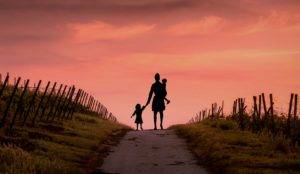Anger is the greatest motivator because it’s limitless. When discussing the stages of grief, psychologist recite the five stages of the Kubler-Ross Model: Denial, Anger, Bargaining, Depression then Acceptance
As most of us who are widowed now know this model is not linear, but throughout the grieving process, you can fluctuate through the stages daily. When I look back at the last months, weeks and days of my husband’s life, I was sitting in the denial phase of grief. I didn’t see how severe his cancer was, and I also didn’t recognize he was dying. Even when he came home to hospice care, I prayed he would get better. But he didn’t.
When he died, I didn’t blame myself for his loss. Cancer killed him.
But as the calendar months flipped, my mind circled around and around that I could’ve done more. I should’ve researched more, I should’ve gone to more doctor’s appointments, I should’ve asked more questions, I should’ve done this or that. I should’ve, I should’ve, I should’ve.
But I didn’t.
Faith was driving on the days he felt sick. I believed he would get better and I had faith he would beat cancer. Faith in the doctors and medical staff who were treating him. Faith in the medicine he was taking, and the treatment procedures he had to endure.
But when cancer took him, my faith was shattered. And my faith was replaced with anger.
Angry the medicine couldn’t save him
Angry the doctors couldn’t save him
Angry the treatments couldn’t save him
Angry I couldn’t save him
Angry that his body failed him.
Feeling anger is not the same as expressing anger. The anger I felt was bottled inside of me, and I didn’t know how to displace it. When I think of anger, I think of someone being red-faced and yelling. Screaming at the top of their lungs, like a child who can’t have ice cream because they didn’t finish their dinner.
But my anger wasn’t like that. It was a slow simmer, like when a volcano is steaming but it is not active. It was inside of me ready to burst, but I can only recall one instance when I truly let my anger out, and it was when something didn’t go my way. Screaming and acting out like the child who couldn’t get ice cream after dinner. It was embarrassing but a learning experience.
Anger happens when we feel threatened, hurt, betrayed, afraid, embarrassed or when we need to release pain. Anger can give us courage and power to address a big problem. Widowhood is scary, and the fear of not knowing what happens causes us to feel anger. The uncertainty of what comes next converts into anxiety, and a common response to anxiety is anger.
Anger can point out where we do not want to be going. But with widowhood, there is no choice. However, there did come the point when I got sick and tired of feeling the way I did. The walls of my apartment felt like a prison, so I left.
I left my apartment, and I walked, and when I returned, I felt relieved and satisfied. When the anger inside of me started to stir, I left. Then I did it again the next day and the next day after that and the next day after that.
Now sitting at 59 months widowed, just short of 5 years. I used my anger repeatedly to empower myself to change. I knew what I didn’t want, so I chased happiness that kept eluding me for so long. In my chase, my anger helped me find a passion for life again. It made me stronger! #widowstrong
It steered me in a new direction and offered me a platform to share my heart openly with others through writing, personal training, coaching and group instruction. Anger is the greatest motivator for change and can point us in the direction where we want to go. The first step is acknowledging and becoming aware that anger can be fuel for moving forward.


